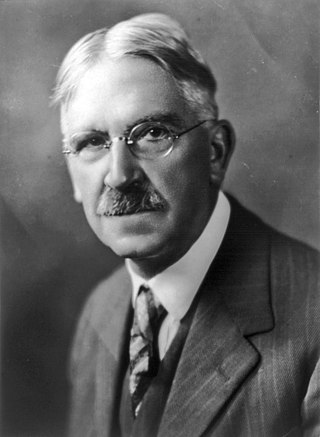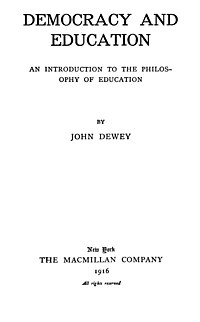
John Dewey was an American philosopher, psychologist, and educational reformer. He was one of the most prominent American scholars in the first half of the twentieth century.
The philosophy of education is the branch of applied philosophy that investigates the nature of education as well as its aims and problems. It also examines the concepts and presuppositions of education theories. It is an interdisciplinary field that draws inspiration from various disciplines both within and outside philosophy, like ethics, political philosophy, psychology, and sociology. Many of its theories focus specifically on education in schools but it also encompasses other forms of education. Its theories are often divided into descriptive theories, which provide a value-neutral description of what education is, and normative theories, which investigate how education should be practiced.

Pragmatism is a philosophical tradition that views language and thought as tools for prediction, problem solving, and action, rather than describing, representing, or mirroring reality. Pragmatists contend that most philosophical topics—such as the nature of knowledge, language, concepts, meaning, belief, and science—are best viewed in terms of their practical uses and successes.

Pedagogy, most commonly understood as the approach to teaching, is the theory and practice of learning, and how this process influences, and is influenced by, the social, political, and psychological development of learners. Pedagogy, taken as an academic discipline, is the study of how knowledge and skills are imparted in an educational context, and it considers the interactions that take place during learning. Both the theory and practice of pedagogy vary greatly as they reflect different social, political, and cultural contexts.
Philosophy for Children, sometimes abbreviated to P4C, is a movement that aims to teach reasoning and argumentative skills to children. There are also related methods sometimes called "Philosophy for Young People" or "Philosophy for Kids". Often the hope is that this will be a key influential move towards a more democratic form of democracy. However, there is also a long tradition within higher education of developing alternative methods for teaching philosophy both in schools and colleges.

The Bertrand Russell Case, known officially as Kay v. Board of Higher Education, was a case concerning the appointment of Bertrand Russell as Professor of Philosophy of the College of the City of New York, as well as a collection of articles on the aforementioned case, edited by John Dewey and Horace M. Kallen.

Kieran Egan was an Irish educational philosopher and a student of the classics, anthropology, cognitive psychology, and cultural history. He has written on issues in education and child development, with an emphasis on the uses of imagination and the stages that occur during a person's intellectual development. He has questioned the work of Jean Piaget and progressive educators, notably Herbert Spencer and John Dewey.

The Educated Mind: How Cognitive Tools Shape Our Understanding is a 1997 book on educational theory by Kieran Egan.
Richard Shusterman is an American pragmatist philosopher. Known for his contributions to philosophical aesthetics and the emerging field of somaesthetics, currently he is the Dorothy F. Schmidt Eminent Scholar in the Humanities and Professor of Philosophy at Florida Atlantic University.

The community of inquiry (CoI) is a concept first introduced by early pragmatist philosophers C.S.Peirce and John Dewey, concerning the nature of knowledge formation and the process of scientific inquiry. The community of inquiry is broadly defined as any group of individuals involved in a process of empirical or conceptual inquiry into problematic situations. This concept was novel in its emphasis on the social quality and contingency of knowledge formation in the sciences, contrary to the Cartesian model of science, which assumes a fixed, unchanging reality that is objectively knowable by rational observers. The community of inquiry emphasizes that knowledge is necessarily embedded within a social context and, thus, requires intersubjective agreement among those involved in the process of inquiry for legitimacy.
Education sciences, also known as education studies, education theory, and traditionally called pedagogy, seek to describe, understand, and prescribe education including education policy. Subfields include comparative education, educational research, instructional theory, curriculum theory and psychology, philosophy, sociology, economics, and history of education. Related are learning theory or cognitive science.
This list of publications by John Dewey complements the partial list contained in the John Dewey article.

Sarah Maxine Greene was an American educational philosopher, author, social activist, and teacher. Described upon her death as "perhaps the most iconic and influential living figure associated with Teachers College, Columbia University", she was a pioneer for women in the field of philosophy of education, often being the sole woman presenter at educational philosophy conferences as well as being the first woman president of the Philosophy of Education Society in 1967. Additionally, she was the first woman to preside over the American Educational Research Association in 1981.

Pragmatic ethics is a theory of normative philosophical ethics and meta-ethics. Ethical pragmatists such as John Dewey believe that some societies have progressed morally in much the way they have attained progress in science. Scientists can pursue inquiry into the truth of a hypothesis and accept the hypothesis, in the sense that they act as though the hypothesis were true; nonetheless, they think that future generations can advance science, and thus future generations can refine or replace their accepted hypotheses. Similarly, ethical pragmatists think that norms, principles, and moral criteria are likely to be improved as a result of inquiry.
Kenneth Wain is a major Maltese philosopher and educator. His areas of specialisation in philosophy are chiefly education, ethics, political philosophy.
The School and Society: Being Three Lectures (1899) was John Dewey's first published work of length on education. A highly influential publication in its own right, it would also lay the foundation for his later work. In the lectures included in the initial publication, Dewey proposes a psychological, social, and political framework for progressive education. Notably, this includes collaborative practical experimentation as the central element of school work. He argues that the progressive approach is both an inevitable product of the Industrial Revolution and a natural fit with the psychology of children. A final chapter details some of the experiments done at the University of Chicago Laboratory Schools.
Transactionalism is a pragmatic philosophical approach to questions such as: what is the nature of reality; how we know and are known; and how we motivate, maintain, and satisfy goals for health, money, career, relationships, and a multitude of conditions of life through mutually cooperative social exchange and ecologies. It involves the study and accurate thinking required to plan and utilize one's limited resources in the fundamental mechanics of social exchange or trans-action. To transact is learning to beat the odds or mitigate the common pitfalls involved with living a good and comfortable life by always factoring in the surrounding circumstances of people, places, things and the thinking behind any exchange from work to play.
Trevor Joeseph Phillips was a British-born educational philosopher and Professor of Educational Foundations and Inquiry at Bowling Green State University, Ohio. He wrote a dissertation on the philosophy transactionalism.

Transactionalism: An Historical and Interpretive Study, was written in 1966 by philosopher Trevor J. Phillips (1927–2016) and first published in December 2013. At the time of its publication, it was the first, most comprehensive account of the origins and evolution of the modern historical, philosophical, psychological, and educational philosophy known as transactionalism.










